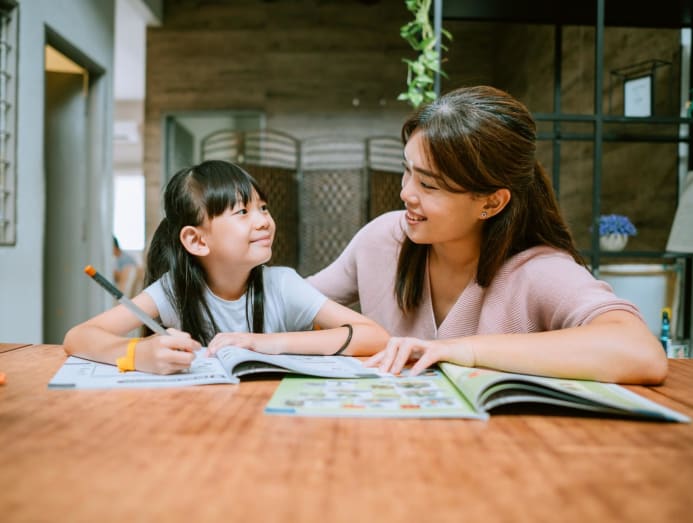I don’t want to micro-manage my kids’ schoolwork. But as a PSLE parent, do I have any other choice?
Ms Kelly Ang has always leaned towards a hands-off approach with her five children's studies. She explains how she is helping her oldest child prepare for the Primary School Leaving Examination without taking over completely.

Ms Kelly Ang used to believe in her children’s autonomy over their school work and studies, but with a major examination a few months away, she is learning something else as a parent. (Illustration: CNA/Samuel Woo, iStock)

This audio is generated by an AI tool.
In October 2024, I declared that I would be easing up on pressuring my five kids to do well in school.
I wrote: “Sometimes our kids need to fall before they can decide to pick themselves up and keep walking. As parents, we can guide and support – but we can’t live their lives for them.”
I received mixed responses to that piece from friends and family, who largely fell into two camps: “Their Grades, Their Choices” and “I’ll Do Anything It Takes To Help My Child Succeed”.
Fellow parents in the first camp told me I should lighten up even more on the revision schedules and supervision. “They’re already in primary school. They must learn the consequences of not completing their work or studying enough for their tests, right?”
On the other side, friends in the second camp urged me to step up my involvement – hire tutors if my children need more help with certain subjects, or push them harder in their extracurriculars to gain an advantage in the Direct School Admissions exercise.
At the time, I wholeheartedly agreed with Camp “Their Grades, Their Choices”. But this year, as my oldest child prepares to sit the Primary School Leaving Examination (PSLE), I’ve found myself getting more and more involved in his studies.
With the PSLE just a few short weeks away, do I still believe in my kids’ autonomy over their studies? Or have I succumbed to parental backseat driving, revving the revision engine wherever I can?
WHEN IS IT TIME TO INTERVENE?
My oldest child wasn’t happy with his final grades at the end of last year. Nevertheless, he’d worked hard in the lead-up to his end-of-year exams so we wanted him to have a proper break for December.
So break we did. We went on not one but two holidays, one with family and one with friends. Video and board games were played and movies watched. We spent time with loved ones, eating, playing our days away and swimming.
In January this year, I told myself and my son that we’d have to work a lot harder in the upcoming months. He agreed solemnly, promising to study as diligently as he could.
The first six months of his Primary 6 year whizzed by, culminating in Weighted Assessment results. He wasn’t satisfied with them.
At the end of Term 2, he came to me with a plaintive request: “I don’t think I can do this alone, Mum. Can you please help me with my PSLE revision?”
I spent hours looking through all the syllabus requirements for his subjects and drew up a detailed week-by-week plan for him, working backwards to ensure he’d cover everything well before his Preliminary Examinations. Then I sat my son down and showed him all the work he’d have to put in over the next 17 weeks.
To my surprise and relief, he was fully onboard with the revision plan and readily agreed to follow it. (Although there was still some moaning, of course. Who likes being forced to study?)
Since then, I've been very pleased with how he’s stuck to his word. There are still some days when he plays a bit more than he studies but so far, he’s been able to recognise this and double his efforts the next day to make up for any lost time.
Lately, I’ve also been trying something new.
My son has expressly asked me to accompany him when he studies, explaining that he concentrates better when I’m there. So I’ve been sitting with him at the study table wherever I can, working on my own projects and tasks while letting him know that I’m available for questions and moral support.
EVERY CHILD IS DIFFERENT
In my column last October, I wrote that “sometimes our kids need to fall before they can decide to pick themselves up”.
I still believe this. But now, I’m also learning that every child has different needs that require different levels or types of attention.
For example, one of my children, also in primary school, is quick and bright academically but requires very close supervision – just to ensure this kiddo doesn’t waste away time on games and YouTube videos.
“Managing” this child in the same way as my oldest would likely be too suffocating. Instead, I focus on lifestyle habits more – for instance, putting strict screen time restrictions in place. With this child, I also devote more time and energy to cajoling, encouraging and sometimes just listening to complaints.
Another child, a few years younger, needs a lot more repetition to retain information, but does well when given attention and time to digest. For this child, we’ve found that being more involved in the learning process is crucial – prescribing work daily and sitting close by to guide and explain.
With each child, we’ve learnt to observe and listen before deciding how involved or helpful we aim to be with his or her academic journey.
EYE ON THE PRIZE
Ultimately, it is impossible to parent well without being extremely invested in our kids’ growth and well-being, no matter how brilliant or responsible or mature they may seem. But education is only one aspect of raising our children.
No doubt, there’s a lot riding on our children's schoolwork. Especially so with the PSLE, which determines what their formal education journey will look like in the next four to seven years: which secondary schools they go to, what track they end up in (the O-Levels, Integrated Programme and so on), and the opportunities they will have access to further down the road.
However, helping our kids do well in school is only part of raising and equipping them to live good lives as adults. It’s not the be-all and end-all of parenting.

I’m not getting more involved in my oldest child’s schoolwork because I want him to feel like his academic performance is the only thing that matters, because it’s not. I’m also not upping the ante just to “motivate” him.
Instead, I’m doing it simply because he asked, which shows me that he’s taking ownership of his own studies.
To me, this is my responsibility as a parent – not to take over the wheel completely, but to give my child the tools and resources he feels he needs in order to give his very best effort and be proud of whatever that may look like.
With the PSLE just three short months away, I make sure to remind my child that the prize we’re keeping our eyes on isn’t a perfect score. Instead, it’s the attitude and mindset he’s forging to approach life’s challenges.
Will he face them with determination and resilience, taking responsibility for and pride in his own effort? Or will he let himself be led by resentment, fear and frustration?
In 20, 30 or even 50 years’ time, I believe these are the things he will still carry with him from this PSLE journey – not how many AL1s or 2s he scored, hours he spent mugging or practice papers he completed.
This, to me, is the true prize: the understanding that the most valuable things in life aren’t merely quantified by a grade or a score. The journey matters more than the destination.
Kelly Ang is a mother of five and a freelance writer.














